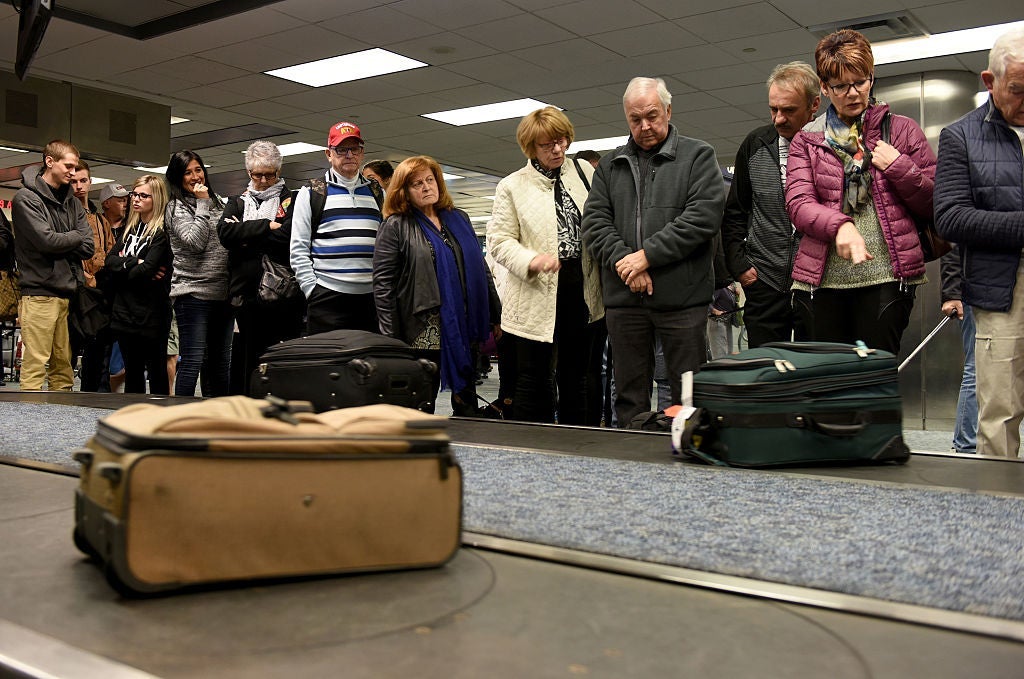FAA Suggests Banning Large Electronic Devices From Checked Luggage
In a strange turn of events, the US government is now trying to convince airlines to ban passengers from checking large personal electronic devices in their luggage. The Federal Aviation Administration said that it's urging airlines to ban the checking of large electronics due to the risk of them catching fire.
This move from the FAA is ironic because the US government imposed its infamous electronics ban on on flights from select airports earlier this year, meaning passengers flying from select airports in the Middle East and Africa could not carry their large electronic devices on the plane. Instead, passengers were forced to check those large electronic devices — the same ones that the government is now trying to ban from being checked due to a major fire risk.
According to the Associated Press, the FAA recently filed a paper with the Civil Aviation Organization in the UN, noting that it had done tests showing that when a laptop's rechargeable lithium-ion battery overheats close to an aerosol spray can, it can cause an explosion. The resulting fire could be so strong as to overpower the aircraft's fire suppression system, and if left untouched, it could lead to "the loss of the aircraft."
The FAA has conducted a total of 10 tests, showing the potential for the device's battery to overheat and catch fire. One test in particular had a can of dry shampoo strapped to a laptop, causing the can to explode within 40 seconds. A fire almost immediately grew rapidly. While the explosion itself couldn't damage the plane, the fire grew so large that the suppression system was unable to extinguish it, leaving nothing to prevent it from spreading further. In addition, the tests concluded that other goods that are allowed in checked baggage also caused fires but no explosions — nail polish remover, hand sanitizer and rubbing alcohol.
The conclusion of the paper was a suggestion that passengers shouldn't be allowed to check their large electronic devices unless they have approval from the airline. The FAA wrote in the paper that several other agencies agreed with its conclusion, such as Airbus, the International Federation of Airline Pilots' Association and more.
Of course, this is the exact opposite of a policy that was, until July, implemented on large electronic devices in carry-on luggage. It's not clear at this time if these findings and the FAA's conclusion to ban electronics from checked luggage would apply to US domestic flights. While nothing has been officially decided yet, this is surely something that will have an implication on flyers if it is indeed passed.

TPG featured card
at Capital One's secure site
Terms & restrictions apply. See rates & fees.
| 5X miles | Earn 5X miles on hotels, vacation rentals and rental cars booked through Capital One Travel |
| 2X miles | Earn unlimited 2X miles on every purchase, every day |
Pros
- Stellar welcome offer of 75,000 miles after spending $4,000 on purchases in the first three months from account opening. Plus, a $250 Capital One Travel credit to use in your first cardholder year upon account opening.
- You'll earn 2 miles per dollar on every purchase, which means you won't have to worry about memorizing bonus categories
- Rewards are versatile and can be redeemed for a statement credit or transferred to Capital One’s transfer partners
Cons
- Highest bonus-earning categories only on travel booked via Capital One Travel
- LIMITED-TIME OFFER: Enjoy $250 to use on Capital One Travel in your first cardholder year, plus earn 75,000 bonus miles once you spend $4,000 on purchases within the first 3 months from account opening - that’s equal to $1,000 in travel
- Earn unlimited 2X miles on every purchase, every day
- Earn 5X miles on hotels, vacation rentals and rental cars booked through Capital One Travel
- Miles won't expire for the life of the account and there's no limit to how many you can earn
- Receive up to a $120 credit for Global Entry or TSA PreCheck®
- Use your miles to get reimbursed for any travel purchase—or redeem by booking a trip through Capital One Travel
- Enjoy a $50 experience credit and other premium benefits with every hotel and vacation rental booked from the Lifestyle Collection
- Transfer your miles to your choice of 15+ travel loyalty programs
- Top rated mobile app


